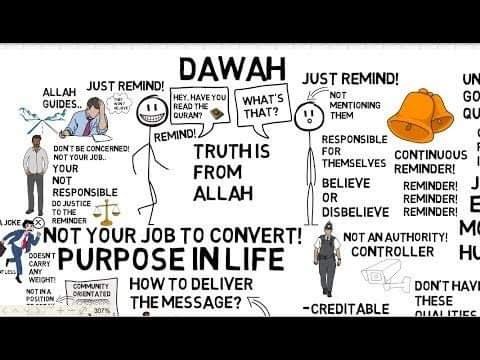Saeeda Shaikh
Esteemed Member
- Messages
- 114
- Reaction score
- 4
- Gender
- Female
- Religion
- Islam
"Say, "O disbelievers,
I do not worship what you worship.
Nor are you worshippers of what I worship.
Nor will I be a worshipper of what you worship.
Nor will you be worshippers of what I worship.
For you is your religion, and for me is my religion." (Qur'an 109)
It is commonly misunderstood that believer and disbeliever can follow their own way of life, rather Quran emphasises that mankind should live their lives as per ordained by God. However, it's completely wrong assumption that I stay on my religion and you stay on your we both are right. Instead if we read the entire chapter we will understand it. It starts with : Say : O disbelievers! I don't worship what you worship (this is to emphasize that a believer worships God, and a disbeliever in God will only worship falsehood and desires by associating partners with God) then at last it say to you be your 'way' and to me be mine.
This means even after acknowledging every kind of arguments, proofs, signs, and revelations from God, if one insist upon falsehood then be it, and they will eventually realise everything in the hereafter (but it will be too late then, there won't be any second chance there). So this verse and chapter is a rhetorical argument with the disbelievers. The concept of calling other to the truth and striving for it, still very much exists and it does not get affected by this verse at all. In that sense Chapter Kaffirun is last arguments with the disbelievers. Before that we (Muslim) need to convey the message of Islam at the best possible way. And we can't deny or refuse our responsibility by saying it's already mentioned in the Quran so we don't need to bother.
Said bin Mina (the freed slave of Abul Bakhtari) has related that Walid bin Mughirah, As bin Wail, Aswad bin al-Muttalib and Umayyah bin Khalaf met the Holy Prophet pbuh and said to him:"O Muhammad (upon whom be Allah's peace and blessings), let us agree that we would worship your God and you would worship our gods, and we would make you a partner in all our works. If what you have brought was better than what we possess, we would be partners in it with You, and have our share in it, and if what we possess is better than what you have brought, you would be partner in it with us and have your share of it."At this Allah sent down Ibn Jarir, Ibn Abi Hatim, Ibn Hisham also has related this incident in the ).
Ibn Jarir, Ibn Abi Hatim, Ibn Hisham also has related this incident in the ).
From above Hadith too, it is clear that we should never ever compromise with our religion and persistently give dawah. Dawah has to be done sincerely for Allah’s sake, and not for any worldly cause. And our duty is just to convey.
May God guide us to the straight path.


I do not worship what you worship.
Nor are you worshippers of what I worship.
Nor will I be a worshipper of what you worship.
Nor will you be worshippers of what I worship.
For you is your religion, and for me is my religion." (Qur'an 109)
It is commonly misunderstood that believer and disbeliever can follow their own way of life, rather Quran emphasises that mankind should live their lives as per ordained by God. However, it's completely wrong assumption that I stay on my religion and you stay on your we both are right. Instead if we read the entire chapter we will understand it. It starts with : Say : O disbelievers! I don't worship what you worship (this is to emphasize that a believer worships God, and a disbeliever in God will only worship falsehood and desires by associating partners with God) then at last it say to you be your 'way' and to me be mine.
This means even after acknowledging every kind of arguments, proofs, signs, and revelations from God, if one insist upon falsehood then be it, and they will eventually realise everything in the hereafter (but it will be too late then, there won't be any second chance there). So this verse and chapter is a rhetorical argument with the disbelievers. The concept of calling other to the truth and striving for it, still very much exists and it does not get affected by this verse at all. In that sense Chapter Kaffirun is last arguments with the disbelievers. Before that we (Muslim) need to convey the message of Islam at the best possible way. And we can't deny or refuse our responsibility by saying it's already mentioned in the Quran so we don't need to bother.
Said bin Mina (the freed slave of Abul Bakhtari) has related that Walid bin Mughirah, As bin Wail, Aswad bin al-Muttalib and Umayyah bin Khalaf met the Holy Prophet pbuh and said to him:"O Muhammad (upon whom be Allah's peace and blessings), let us agree that we would worship your God and you would worship our gods, and we would make you a partner in all our works. If what you have brought was better than what we possess, we would be partners in it with You, and have our share in it, and if what we possess is better than what you have brought, you would be partner in it with us and have your share of it."At this Allah sent down
From above Hadith too, it is clear that we should never ever compromise with our religion and persistently give dawah. Dawah has to be done sincerely for Allah’s sake, and not for any worldly cause. And our duty is just to convey.
May God guide us to the straight path.


